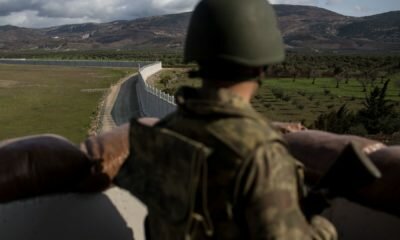Somali News
Yesilcam overtakes Hollywood and Bollywood in Somalia
Published
3 days agoon

Turkish TV series attracts Somali cinema audiences as Ankara’s soft power spreads across the Horn of Africa country.
 Mogadishu, Somalia – It used to be Hollywood. Then it became Bollywood. Now Yesilcam, as Turkey calls its film industry, has taken over silverscreens in Somalia.
Mogadishu, Somalia – It used to be Hollywood. Then it became Bollywood. Now Yesilcam, as Turkey calls its film industry, has taken over silverscreens in Somalia.
Turkish soap operas have gained so much popularity that some people have set up makeshift cinemas while others have started businesses of translating the films.
Every evening, Somali families would gather in front of their tv screens to watch them.
Anisa Ali, a 29-year-old mother of two, and her friends are watching Kara Para Ask (Black Money Love), a detective-romance Turkish TV series featuring fictional characters Omer Demir and Elif Denizer.
Ali is glued to the screen, her hands buried inside the grey sofa she is sitting on. She inches forward, lifts her upper body suddenly, only to fall back into the sofa.
It’s as if her favourite football team just missed a crucial chance against an arch-rival. Ali is furious about what’s happening to Demir – her favourite character.
In the scene, as Demir is enjoying his engagament party, the mother of his ex-fiance, who died mysteriously, gate-crashes the event to sabotage it.
“They are full of twists and emotions,” Ali told Al Jazeera. “When we are watching, it’s like we are part of the story. We shout at the characters telling them ‘do this, defend yourself, speak up’ and so on. We participate from our sofas.”
This is the fifth series Ali and her friends have followed in the last five years.
Yesilcam gained traction in the country after Turkey and Somalia renewed relations in 2011. The improvement in ties began during a devastating famine that killed more than 250,000 Somalis.
Turkey showed compassion and provided emergency relief aid, built schools, hospitals and roads, and invested in Somalia where Turkish cinema is seen as an addition to Ankara’s soft power.
And due to a group of translators and voice actors, there is no language barrier for the Somali audience.

Somalis prefer Turkish drama series over Hollywood and Bollywood because they go on for months and provide daily entertainment [Feisal Omar/Reuters]
They download Turkish films from the internet, re-edit, add Somali voiceover and sell them to local TV stations as well as uploading them onto their social media accounts.
Somalis prefer Turkish drama series over Hollywood and Bollywood because they go on for months and provide daily entertainment. Actors are mostly Muslims and therefore the Somali audience can relate to many of their stories and they portray realistic characters that are full of twists and turns.
In contrast, Hollywood movies are seen by Somalis as full of violence and littered with nudity while Bollywood cinema is thought of as nothing more than well-groomed male and female actors dancing provocatively.
The team at Fanproj has been working on Kara Para Ask for about a year now. It has been one of their most successful projects and they are determined to build on that.
“Our main focus now is Turkish films,” Mohamed Abdulqadir, a voice actor and translator, said.
“Somalis love Turkish films and they are more interested when it’s aired in Somali language. Our job is to translate for them.”
His manager, Mohamed Abukar, agrees that the demand for Yesilcam is huge.
“Every time we post films online, we receive lots of positive comments on Facebook, YouTube and Twitter.
“The biggest benefit is that Turkish films are informative. Before we decide which film to translate, we consider the storyline and the benefit for our audiences.” Abukar added.

Somali production companies download Turkish films from the internet and add Somali voiceover before selling to local TV stations [Nuur Mohamed/Al Jazeera]
“As men, our family role is outside [the house], women do the housework and look after the children. They waste so much time watching these series and therefore neglect their husband who needs attention after coming home from work tired,” Abdi Qadir Sheikh, a 29-year-old father-of-two, told Al Jazeera.
“While busy watching the films, they also neglect children. They don’t have time to give them milk and dinner. A child could crawl into the kitchen and burn itself or pour water on itself,” he added.
The country’s religious figures argue that uncensored content is also damaging the fabric of Somali society.
Sheikh Aadan Moallim wants a total ban on Turkish films, arguing that its negative influence is destroying families.
“Women learn how to lie, how to deceive and they meet bad people. That’s against our religion,” he told Al Jazeera.
“Their [the films’] only contribution is to misguide Somalis and cause family breakups. There are women who would stay up all night watching films and won’t listen to their husband – that is haram.” Moallim added.
While Turkish films are becoming part of the daily life for many Somalis in and out of the country, Yesilcam is polarising the Somali society.
“We let them [men] watch their football, they should let us watch our films,” Ali said.
You may like
-


Base race in the Horn of Africa
-


Turkey’s foray into Somalia is a huge success, but there are risks
-


Somalia: Turkish foundation’s school hosts 500 students
-


Trump warns Erdogan to avoid clash between U.S., Turkish forces
-


Somalia, Turkey ink trade deals to boost bilateral ties
-


Plane dangles off cliff after skidding off runway in Turkey
Somali News
BREAKING: 2 blasts, gunfire rock Somalia’s capital
Published
2 hours agoon
Feb 23, 2018
MOGADISHU, Somalia (AP) — A Somali police official says two car bomb blasts have rocked the capital, Mogadishu, followed by sustained gunfire. Three people have been killed.
Capt. Mohamed Hussein says the first blast, apparently caused by a suicide car bomber, occurred near Somalia’s intelligence headquarters.
The second blast occurred near parliament’s headquarters, where security forces have engaged with gunmen thought to be trying to attack the presidential palace.
The explosions have shattered a months-long period of calm in Mogadishu, which is often the target of attacks by the al-Shabab extremist group.
There is no immediate claim of responsibility for Friday evening’s blasts.

AFP — Garowe – The new freezers at Somalia’s only forensic laboratory can store thousands of DNA samples, although for now there are just five.
The big hope is that they could be the start of a revolution in how the troubled Horn of Africa country tackles its widespread sexual violence – provided some daunting hurdles are overcome.
The first sample arrived at the start of the year taken on a cotton swab from the underwear of a woman, a rape victim from the village of Galdogob.
It was wrapped in paper and driven 250km to the Puntland Forensic Centre in Garowe, capital of semi-autonomous Puntland, slipped into a protective glass tube and placed in one of the three ultra-low temperature fridges.
If DNA ID can be teased from the sample, this would be a crucial step in convicting the woman’s rapist.
No longer would it be a case of he-said-she-said, in which the survivor is less often believed than the accused. Two decades of conflict and turmoil have made Somalia a place where lawlessness and sexual violence are rampant.
“Now, people who have been raped hide because they don’t have evidence,” said Abdifatah Abdikadir Ahmed, who heads the Garowe police investigations department.
But with the lab, he said, “it’s a scientific investigation. There are biological acts you can zero in on.”
Challenges
Not yet, however.
Abdirashid Mohamed Shire, who runs the lab, has a team of four technicians ready but is awaiting the arrival of the final pieces of equipment.
Their work to provide the evidence that might convict or exonerate is yet to begin.
And the pressure is on. The freezers mean the DNA samples can be safely stored for years but Somali law allows a rape suspect to be held for a maximum of 60 days. Shire needs the analysis and identification machines urgently so that, as he put it, “justice will be timely served”.
The laboratory, partly funded by Sweden, was launched last year after the Puntland state government enacted a Sexual Offences Act in 2016, which criminalised sexual offences and imposed tough penalties.
But technology alone will not solve Somalia’s many judicial weaknesses.
The DNA sample from Galdogob, for example, was stored in unclear and unrefrigerated conditions for five days before being sent to the lab, meaning a defence counsel could potentially argue the DNA evidence had been tampered with.
Human rights lawyers worry the new lab might backfire for this reason.
“A lot of thought needs to be given to how the chain of custody can be preserved in these kinds of cases,” said Antonia Mulvey of Legal Action Worldwide, a Kenya-based non-profit organisation.
More fundamental still is the failure of Somalia’s police to take sexual assault cases – and their jobs – seriously.
Corruption is rife, with a legal advisor to Puntland’s justice ministry saying officers “meddle” in cases, undermining them for personal gain.
“My concern is that the corrupted system could not make a sure success of the lab,” the advisor said, requesting anonymity to speak candidly. “Investing in the lab is good, but we need to think about the preconditions.”
The UN Population Fund (UNFPA) which helped pay for the lab is trying to address this by running training programmes for dozens of the Garowe police on sample collection, gender violence investigations and documentation.
But, the legal advisor cautioned that donors can only do so much.
“The issue is more complicated than training police. It relates to the political commitment of the government. UNFPA can train police but who will pay those you train? Are they given power to do the work?”
Briefing Room
US military says drone strike in Somalia kills 4 extremists
Published
1 day agoon
Feb 22, 2018
VOA — A U.S. drone strike has killed several al-Shabab militants in southern Somalia, officials tell VOA.
Local sources said missiles fired Wednesday targeted a rickshaw carrying five al-Shabab militants near Jamaame, in the southern Lower Juba region.
“I can tell you that the airstrike hit a rickshaw and that five militants were killed. It was carried out by U.S. drone, helping our intelligence forces on the ground,” a Somali government official told VOA Somali on the condition of anonymity.
The attack was confirmed by witnesses and local residents, who also asked for anonymity because they feared militant reprisals.
Somali officials said they were investigating the identity of those targeted. Some sources said two of those in the rickshaw were civilians traveling with three militants.
A statement Thursday from the U.S. Africa Command said the strike was carried out by the U.S. military “in coordination with the Federal Government of Somalia.” The statement said the strike killed four terrorists and no civilians.
On Tuesday, local residents in the region reported another airstrike that destroyed an al-Shabab training camp in the nearby town of Jilib. That airstrike, also confirmed by U.S. Africa Command, killed three militants.
The U.S. military has carried out dozens of airstrikes against al-Shabab and Islamic State militants in support of Somalia’s federal government.

BREAKING: 2 blasts, gunfire rock Somalia’s capital

Somalia’s first forensic lab targets rape impunity

Two Somali men stabbed to death in north London as 2018 toll reaches 15

Ismail Mohamed Wants To Be Ohio’s First Somali-American Legislator

Novels my way to respond in measured way: Nadifa Mohamed

Djibouti ends Dubai’s DP World contract to run container terminal

Canadians call for return of relative held in Ethiopia

Father cleared after judge says evidence of FGM on six-year-old was ‘wholly inconclusive’

INTERVIEW: Somalia gears towards improving its monetary policies

US military says drone strike in Somalia kills 4 extremists

Somalia’s first forensic lab targets rape impunity

Canadians call for return of relative held in Ethiopia

Two Somali men stabbed to death in north London as 2018 toll reaches 15

INTERVIEW: Somalia gears towards improving its monetary policies

Novels my way to respond in measured way: Nadifa Mohamed

Somalia: Detained Children Face Abuse + INTERVIEW

Families plead for update on Somali deportation case at impromptu town hall

U.S. military denies Al-Shabaab killed its soldier in Somalia

US military says drone strike in Somalia kills 4 extremists

BREAKING: 2 blasts, gunfire rock Somalia’s capital

INTERVIEW: Somalia gears towards improving its monetary policies

Somalia: Detained Children Face Abuse + INTERVIEW

Families plead for update on Somali deportation case at impromptu town hall

Somalia Tax Argument From Both Sides: Bakara Traders vs The Government

Somalia military court sentences army officer to death

Somali traders boycott business over new government tax

Somali refugees enslaved in Libya return home

Somali Migrants Returning From Libya Tell of Abuse, Horror

Somali government introduces 5% sales tax to boost revenues

LONDON: Crowd pickets Wormwood Scrubs demanding justice following death of inmate
TRENDING
-

 Crime20 hours ago
Crime20 hours agoSomalia’s first forensic lab targets rape impunity
-

 Canada22 hours ago
Canada22 hours agoCanadians call for return of relative held in Ethiopia
-

 Crime20 hours ago
Crime20 hours agoTwo Somali men stabbed to death in north London as 2018 toll reaches 15
-

 Business1 day ago
Business1 day agoINTERVIEW: Somalia gears towards improving its monetary policies
-

 Books20 hours ago
Books20 hours agoNovels my way to respond in measured way: Nadifa Mohamed
-

 Reports2 days ago
Reports2 days agoSomalia: Detained Children Face Abuse + INTERVIEW
-

 Minnesota2 days ago
Minnesota2 days agoFamilies plead for update on Somali deportation case at impromptu town hall
-

 Briefing Room2 days ago
Briefing Room2 days agoU.S. military denies Al-Shabaab killed its soldier in Somalia


You must be logged in to post a comment Login